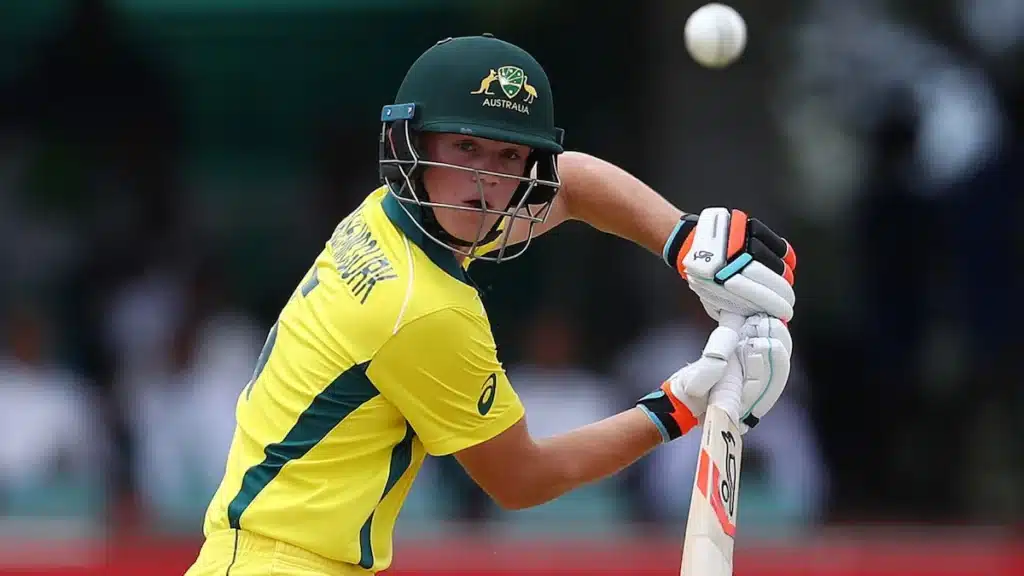Jarrod Kimber, CS Chiwanza
It was October 2023, and South Australia were chasing a massive 436 for victory against Tasmania in the 50-overs Marsh Cup. One of the openers, Henry Hunt, jogged across for a single because Jake Fraser-McGurk had steered the ball to the fielder at third. The shot had no timing. But, that could be expected, it was the first delivery the 22-year-old had faced. That, however, was the last single Henry would witness from his partner in a while.
Henry watched as Fraser-McGurk cross-batted the second delivery he faced for a six, followed it up with another six, and then a four off the third. He rampaged 27 runs off the first seven balls he faced. But, he wasn’t done yet. Fraser-McGurk was a 5’7” gladiator providing entertainment to a small crowd that had turned up to watch. He mauled Tasmania’s bowlers as he compiled a 29-ball century, the fastest century in List A cricket, beating AB de Villiers’ 31-ball ton against the West Indies in 2015.
Hunt watched Fraser-McGurk’s 38-ball 125 in amazement. This was the 22-year-old’s second coming.
Fraser-McGurk made his first appearance in the Marsh Cup, Australia’s List A league, in 2019 for Victoria. He came away with a well-made 54 on debut, but that was his highest 50-over score for the next three years. His first-class career followed the same path: half-century in his maiden outing and then low scores over the next three years. He couldn’t dine out on those milestones forever and it wasn’t long before the powers-that-be at Victoria downgraded his contract.
Feeling unappreciated by Victoria, Fraser-McGurk explored other opportunities. South Australia came knocking and he signed with them. He returned a List A average of 32.5 in his first two seasons. In 2023, the Victorian was quoted by Code Sports pledging allegiance to red-ball cricket. His numbers for the 2023-24 season do not look outstanding, with an average of 19.56, but he registered his maiden first-class ton in the same window.

However, his best exploits have been in T20 cricket. He was the leading run-scorer for the Melbourne Renegades during this year’s Big Bash League, smacking 257 runs at 32.12 with a strike rate of 159. He followed that up with a stint with the Dubai Capitals in the United Arab Emirates’ ILT20 competition earlier this year, where he averaged 36 at 214.
In one of those matches, he drilled a Trent Boult delivery for four on the fourth ball he faced on his way to a 25-ball 54 that set Dubai Capitals up for a win. His performances for the Renegades and Dubai Capitals earned him his maiden Australian T20 cap.
Fraser-McGurk’s T20 batting is vibes and eye. He makes big bold decisions, like standing three feet outside leg stump, and then his eye makes up for it. Then you have to deal with the power, which is seemingly huge. And the fact that a boundary can come in any direction. It doesn’t look like it should be repeatable, and so far it hasn’t been.
Bowling to him is like trying to capture a feeling in a glass bottle. His batting is moving parts mixed with murderous intent while chewing on an adrenal gland.
Most of this is against pace. How it translates to the spinning ball in Asia is another question. But there are many things we don’t know about him yet, he’s a Donalds Rumsfeld cricketer, full of unknown unknowns.
What we do know is that in March 2024, Delhi Capitals found themselves two overseas players down. Lungi Ngidi was still recovering from a lower-back injury and Harry Brook withdrew following his grandmother’s passing. Ricky Ponting, who had sent Fraser-McGurk a text earlier in the year, alerting him of his impending T20I debut, sent him another text, and he was on a journey to the IPL.
That journey exploded into the cricket world’s collective consciousness with a 35-ball 55 against Lucknow Super Giants, helping Capitals clinch victory on his IPL debut. Fraser-McGurk arrived at the crease after David Warner had fallen for 8, and scythed through bowlers. He clubbed three successive sixes off Krunal Pandya while Rishabh Pant watched from the other end, much like Hunt had done back in October.
In December, Glenn Maxwell had tweeted that Fraser-McGurk was so good he didn’t have a ceiling.
It was a thought that gained currency after people had watched Fraser-McGurk bat.
In his second game, Fraser-McGurk had Sourav Ganguly seemingly enraptured. This time Delhi were searching for a quick finish against Gujarat Titans, who had been bowled out for 89, the lowest score in IPL 2024 so far. Thus Fraser-McGurk was sent out to open. The first ball he faced was audaciously sent flying over the bowler’s head for six, leading to an almost bemused smile from Ganguly, the Capitals’ director of cricket.
It’s one of the features of Fraser-McGurk’s batting. He doesn’t look like he swings his bat too hard and yet sends balls flying into the stands regularly. Instead of brutal, raw strength, the batter’s secret to clearing boundaries lies in his quest to find the middle of the bat at all times.
The big stage does not scare him. He isn’t just talented, he has the sports gene too. Cricket was a part of his family life from the time he was nine-years-old, when he joined the Boroondara Cricket Club and was playing for the same team as his father at 12. In one match, Fraser-McGurk senior took a five-wicket haul while his son kept wicket. Fraser-McGurk went on to score a half-century in that contest. He was a prodigy and the state of Victoria earmarked him for future success.

However, not all prodigies make it. Some may find the step up to the professional arena too difficult. Others flame out and slip to semi-pro cricket and are never heard from again. Fraser-McGurk was different. He might have needed more time to adapt to the demands of playing at a higher level. But he wasn’t about to disappear.
His mother played netball, and in addition to his cricket adventures in the summer, his father was a semi-professional tennis player. Fraser-McGurk inherited fast twitch fibres, visual acuity, and a few other genetic advantages that put him ahead of other aspiring cricket players.
More than a decade ago, there was an injury replacement that shook the IPL by storm. Dirk Nannes, playing for Royal Challengers Bangalore, had bowled a wicket-maiden against Mumbai Indians, but would take no further part in the game. Soon enough, he was ruled out of IPL 2011 with a side strain. RCB were floundering at the start of the season with one win in four games – much like DC were in 2024. Nannes’ replacement arrived, and from his first match for his new franchise, embarked on what would become one of the legendary careers in T20 cricket.
That man, answering to the name of Chris Gayle, hit a century in his first game for RCB, and they got back to winning ways, going all the way to the final.
There’s still some way to go for Capitals to do that. There is even longer a road for Fraser-McGurk to follow in Gayle’s footsteps. But he has trod on the path. And he’s already hit a century one ball quicker than even Gayle did. We don’t know what his future holds. But it’s an exciting bunch of unknown unknowns.




